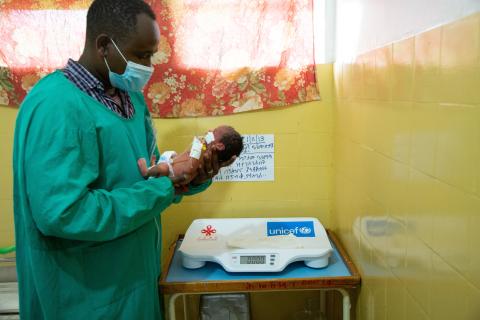Pre-trial feasibility study on integration of care for vulnerable infants in Ethiopia
This is a summary of the following paper: McGrath M, Girma S, Berhane M et al (2024) Strengthening implementation of integrated care for small and nutritionally at-risk infants under six months and their mothers: Pre-trial feasibility study. Maternal & Child Nutrition, 21, e13749. https://doi.org/10.1111/mcn.13749
It is estimated that 15.5% of infants under six months (u6m) are wasted, 17.4% are underweight, 19.9% are stunted, and 14.7% are born with low birthweight in low- and middle- income countries. Yet the care of at-risk infants u6m has long been overlooked in life-course interventions to prevent and treat malnutrition. To address this gap, the MAMI Care Pathway was developed, modelled on the Integrated Management of Childhood Illness (IMCI) guidelines. To strengthen its implementation, a qualitative feasibility study was conducted in preparation for a randomised controlled trial (RCT) in Ethiopia.
Health workers from facilities outside the RCT study health facilities were purposively selected, and relevant policymakers were identified through purposive and referral sampling for interviews and surveys. A total of 42 individuals participated between September 2021 and March 2022. All health workers attended a two-day orientation on the MAMI Care Pathway and its implementation materials. The Bowen framework was used to analyse the health workers’ interviews on the themes of acceptability, demand, implementation, and practicality. Policymakers’ survey and interview data were analysed and results were categorised into themes of demand, consistency, acceptability, evidencing policy, and opportunities.
The care pathway was generally seen as acceptable among health workers. Many noted that inpatient severe wasting treatment (the current standard) was often deemed unacceptable, which made the new outpatient-based care pathway more appealing. However, health workers believed mothers’ acceptance would depend on practical factors such as medication availability and past healthcare experiences. Mothers facing food insecurity or economic hardship might find counselling-based interventions less relevant.
There was strong demand for the care pathway to fill the existing gap in outpatient care for wasted infants u6m. Health workers welcomed its proactive approach that combined prevention and treatment particularly its integration of maternal care, including mental health support. While embedding the care pathway within IMCI was seen as an opportunity to streamline services and reduce ‘missed opportunities’, concerns were raised about already overburdened staff and underperforming services.
Perspectives on practicality varied. Some health workers were already informally dedicating time to these infants, while others found the approach inconsistent with their existing roles due to the additional time required. Policymakers acknowledged that at-risk infants u6m and their mothers were marginalised in current guidance and services. They agreed that integrating or mainstreaming the care pathway into existing policies was essential. All policymakers stated the approach was necessary, 78% believed it was feasible, and many emphasised the need to adapt it to Ethiopia’s complex healthcare landscape.
The study concluded that implementing the MAMI Care Pathway in Ethiopia is feasible if health workers receive additional support to ensure quality care and families are assisted in accessing services. The involvement of intended users in implementation research is critical throughout the process. The findings highlight the importance of addressing interpersonal aspects of care delivery through training and ongoing support, particularly for maternal mental health and for newly recruited staff who have not yet built relationships with mothers. By strengthening these aspects, the care pathway can be effectively embedded within routine healthcare services.


